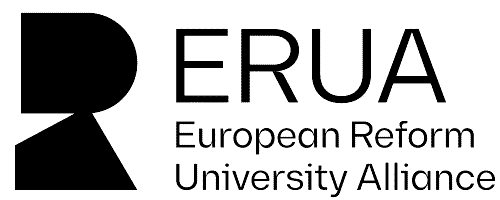European University - ERUA
www.erua-eui.eu
The Project
The "European Reform University Alliance" (ERUA) is an alliance of eight European reform universities with a particularly strong profile in the Humanities, Social Sciences and Arts. From Spain to the Aegean, the eight partner universities cover 3 time zones and involve more than 80,000 students. The Alliance want to jointly pursue new paths in research, teaching and institutional development.
ERUA is part of the European Universities Initiative (EUI) of the European Commission, which, as one of the key initiatives of the European Union (EU), aims to advance the development of a European Education Area and the implementation of the European Higher Education Strategy.
Mission Statement
Shaping Europe's Future Through Reform, Empowerment, and Openness
We, the European Reform University Alliance (ERUA), have set up and developed our consortium around our foundational principles as a reform alliance. By pooling our individual strengths and past achievements, we will increase our societal impact by creating a powerful academic hub for critical and innovative contribution to a free, more equitable and democratic Europe. We believe that to shape peaceful, just, and sustainable futures, higher education and research must be transformed.
Reform is at the heart of ERUA, both in name and in spirit, and grounded on the following principles:
• Reform is being critical. We follow the function of the modern university and seek to reflect, assess, and advance alternatives to current models. We do so by drawing upon the different experiences and backgrounds of the university community that embody the societal diversity that surrounds us and encourages all to participate in shaping the future. This leads us to assume a vision-driven approach and continuously question and transform our own organization and institutions.
• Reform is empowering students. We offer students a rich and diverse environment with a shared pedagogical approach focused on active learning, personal development, civic involvement, societal change, and critical thinking. The distinctive learning experience in ERUA is based on a student-centered approach developing personalized learning pathways in a multilingual and multicultural environment. This European experience will enable future European citizens to become engaged but critical change-agents driving the European project.
• Reform is promoting initiative. We strive to enable free thinking within and around our institutions by engaging our community via a bottom-up approach based on individual and collective initiative, diversity of expertise and the serendipity of encounters.
• Reform is being open. We break barriers between disciplines, between academia and the wider society and promote open science providing access to our academic work and its results to anyone. Our strengths enable us to develop original interdisciplinary approaches and to seek novel solutions to contemporary challenges by fostering a STEAM approach, integrating the Arts and Humanities into the Sciences.
• Reform is making a difference. We shape our educational programs and research initiatives to achieve measurable societal impact. To do this, we work in close collaboration with a wide range of actors, including other academic institutions, local communities and territories, business and non-profit organizations.
• Reform is fostering sustainability. It drives us to place the future of our planet and that of humanity at the heart of everything we do, to move away from classical indicators of growth towards a new vision of individual, societal and global wellbeing.
Vision
Uniting Minds, Bridging Divides
ERUA is unique amongst European Universities thanks to our focus on the social sciences, humanities and arts. Our public value lies in our capacity to critically reflect and contribute to solving the global challenges of our times with an interdisciplinary perspective, which draws on our ongoing and fruitful dialogue with science, technology, engineering and maths (STEM).
By bringing together academics from Europe’s East and West, North and South, and welcoming students from top and lower socio-economic deciles, from rural and urban, insular and mainland settings, local and global backgrounds, ERUA aspires over the coming years to create a genuinely integrated European community, in which each university will retain its individual traits while working together to create a common, transformative and long-term vision of education, research, innovation and service to society in Europe.
Values
Embracing Diversity, Empowering People
ERUA builds on shared core values, while embracing diversity in role, specific aims and approaches at the partner universities:
● Openness: We are open by default. As an alliance we adopt innovative policies and solutions, flexible and effective joint structures, and stream-lined operational models that are as transparent as possible. Together we promote Open Science and Open Societies.
● Student-centered: Training tomorrow’s citizens is our primary driver. This is why ERUA will continuously seek the active engagement of our students, both as learners and partners in teaching and research and as agents of change.
● Inclusiveness: ERUA is deeply inclusive. We are proud of our geographical, cultural, economic, and linguistic diversity and constantly strive to ensure that no one is left behind.
● Humanism: A thriving civil society requires a caring approach that fosters human wellbeing in a sustainable, respectful, and forward-looking manner. We promote this hrough our roots in the humanities, social sciences and arts and our deep commitment to academic freedom.
For more info, visit the ERUA website!
 Funded by the European Union. Views and opinions expressed are however those of the author(s) only and do not necessarily reflect those of the European Union or European Education and Culture Executive Agency (EACEA). Neither the European Union nor the granting authority can be held responsible for them.
Funded by the European Union. Views and opinions expressed are however those of the author(s) only and do not necessarily reflect those of the European Union or European Education and Culture Executive Agency (EACEA). Neither the European Union nor the granting authority can be held responsible for them.







.jpg)
